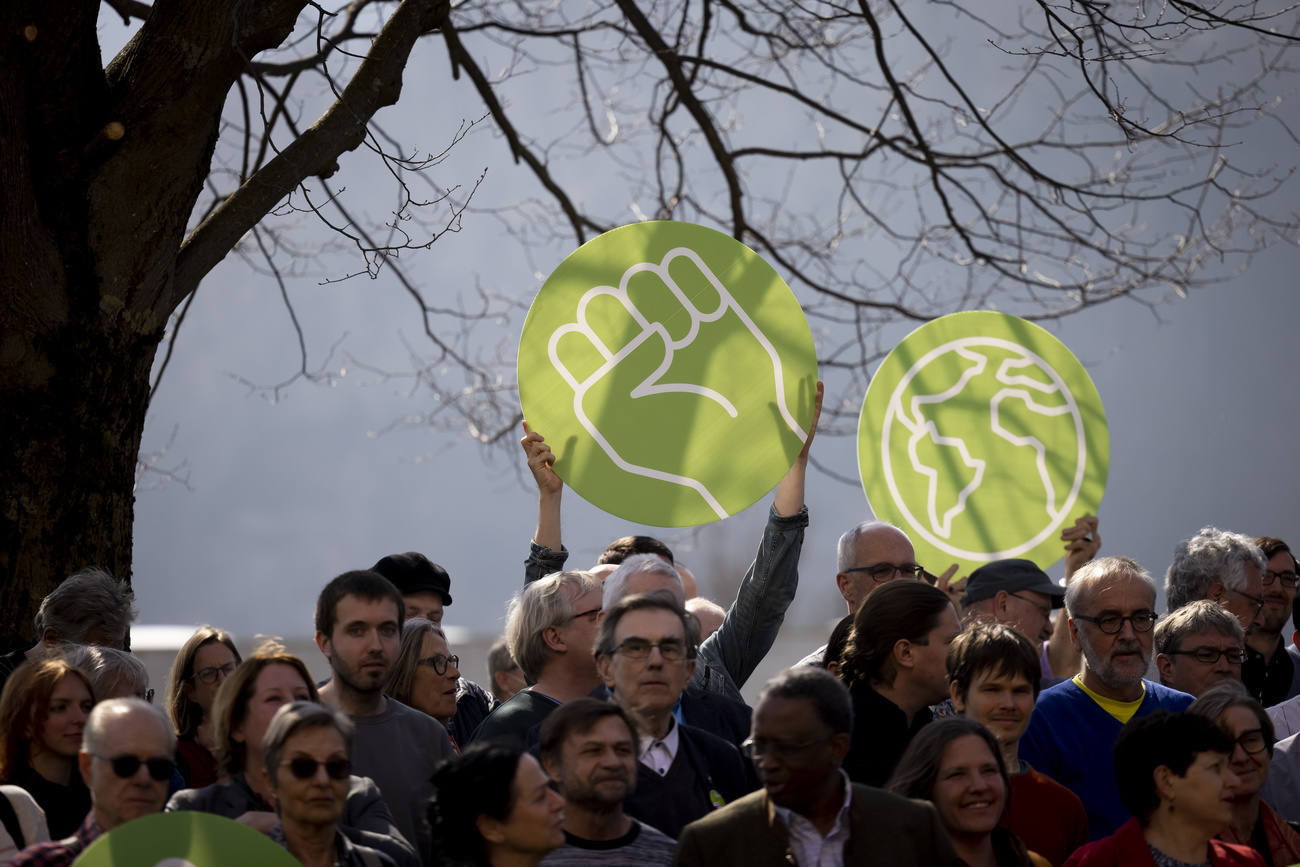
Right-wing Swiss party exceeds 30% for first time, says poll

Following its victory in the 2023 federal elections, the right-wing Swiss People’s Party has set a record with 30.4% of voting intention. The left has stabilised, while the liberal parties are losing ground, according to a mid-term election barometer.
As elsewhere in Western Europe, the conservative right continues to make headway in Switzerland. However, the trend is more moderate here than in other countries, according to the poll for the Swiss Broadcasting Corporation conducted by the Sotomo research institute.
The Swiss People’s Party, which won the largest share of votes in the 2023 parliamentary elections, is continuing to grow. Switzerland’s largest party has gained a further 2.5 percentage points in two years. It currently has a 30.4% share of voting intention, the best result in its history.
If the trend continues, the party could surpass the 30% mark for the first time at the 2027 federal elections. Its best result to date came in 2015, when it won 29.4% of the vote.
Setback for the liberals
The centre-right Radical-Liberal Party has fallen by one percentage point to 13.3% of voting intention, the worst result in its history. The Sotomo institute points out that this is also in line with the trend in other European countries, where liberal parties are struggling.

More
Swiss politics set to shift to the right
The Centre Party also fell back by half a point, from 14.1% in 2023 to 13.6%. If this result were repeated in the election, the Centre Party – the result of a 2021 merger between the centre-right Christian Democratic Party and the centre-right Conservative Democratic Party – would become the third political force in the country, overtaking the Radical-Liberals.
The big losers in the 2023 elections, the left-wing Greens, appear to be stabilising, with an increase of 0.5 points, bearing in mind a margin of error of +/- 1.2 points. Support for the left-wing Social Democratic Party is also stable, with an identical increase.

More
Poll: the ‘Green wave’ subsides in Switzerland
This indicates a stabilisation of the left-wing parties, or even a slight increase, while the strong growth of the People’s Party signals a shift to the right, analyses the Sotomo institute. “Political polarisation is becoming more pronounced in Switzerland, with the poles gaining strength at the expense of the more moderate parties,” notes Sotomo political scientist Michael Hermann.
Immigration considered less urgent
The barometer also asked citizens about the main political challenges. In Switzerland, where the government is based on the principle of concordance, the ranking of issues is particularly decisive in measuring the strength of the parties. In other democracies, the assessment is based more on the work of the parties in government or in opposition.
For most of those surveyed, health insurance premiums remain the main challenge, but their degree of urgency has diminished. Michael Hermann believes this is probably because the survey was carried out before September 23, when the average 4.4% rise in monthly health insurance premiums for next year was announced by the Federal Office of Public Health.
European issues gain in importance
In second place was immigration and asylum, an issue dear to the conservative right. But this too has lost importance. “However, other key People’s Party issues have gained in importance, such as crime and security, as well as sovereignty and independence,” said Hermann, who sees this as one explanation for the party’s rise.

More
Election barometer: Switzerland remains an island of political stability
The issue of relations with the European Union, on the other hand, was cited more frequently. This is influenced by the topicality of the issue, according to Sotomo, since the electorate will soon have to vote on the new agreements between Bern and Brussels. The institute points out that the growing importance of European issues is also linked to the 39% tariffs imposed on Switzerland by US President Donald Trump.
For the authors of the barometer, this customs dispute is also having an impact on perceptions of the economic situation. For the first time since 2020, when the Covid pandemic was confining people, the economy is once again taking centre stage.
The election barometer of the Swiss Broadcasting Corporation (Swissinfo’s parent company) was carried out by the Sotomo research institute on the basis of data collected between August 25 and September 11. 32,147 people took part in the survey, both on the SBC websites and on the Sotomo website. The margin of error is +/- 1.2 percentage points.
Since survey participants recruit themselves (opt-in), the composition of the sample is not representative of the population. For example, men generally participate more than women in political surveys. Distortions in the sample are corrected by statistical weighting procedures.
Edited by Samuel Jaberg. Translated from French by DeepL/ts

In compliance with the JTI standards
More: SWI swissinfo.ch certified by the Journalism Trust Initiative




























You can find an overview of ongoing debates with our journalists here . Please join us!
If you want to start a conversation about a topic raised in this article or want to report factual errors, email us at english@swissinfo.ch.